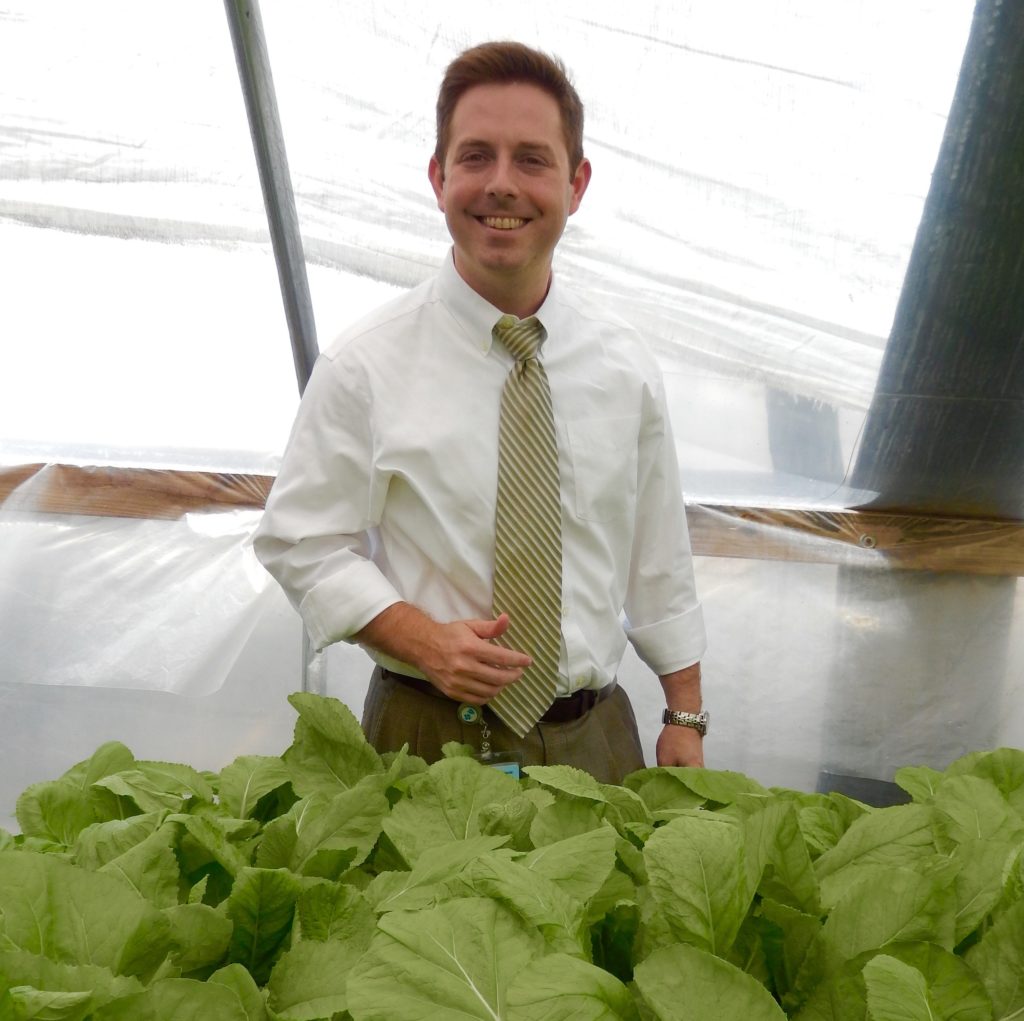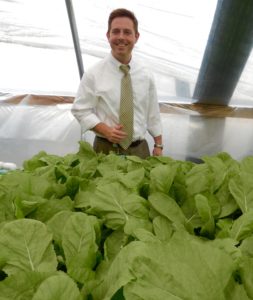By Tina Dirmann
BCBSLA Foundation Staff Writer
It was just a handful of weeks ago when we got the news that Michael Tipton would serve as the new president of the Blue Cross and Blue Shield of Louisiana Foundation. And most pleased with that choice? The Foundation’s very own board of directors, of course.
As we hear it, they were impressed at first sight.
“Everyone found him to be energetic, enthusiastic, open-minded and resourceful,” said Dr. Richard Atkins, who, as chairman of the board, helmed the effort to recruit a new leader for the Foundation. “Even in our early interviews, we all saw that. He just came across so well that I think we all realized what an asset he would be. He is a bright and enthusiastic leader who we believe will give 110% to whatever he does.”
As luck would have it, the Foundation vacancy became available just as
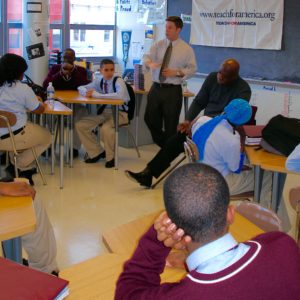
Tipton was in the process of leaving a successful seven-year post as the executive director for Teach For America, where he drove up teaching recruits in South Louisiana from 50 to 180 and increased fundraising from $700,000 annually to $3.7 million.
It’s that kind of dynamic leadership that board members wanted to harness for the Foundation. And so, Tipton officially took on the role in July. And though he’s new in the job, he’s already setting the bar high.
“Every board member has come up to me so far and said, ‘Wow, he’s really doing great,” Atkins added “He’s intuitive, that’s the thing we appreciate about Michael as a leader. He senses what the needs are out in a community and sets out to be part of the solution. And he does it from the standpoint of what’s best for the recipient. He’s very humble, but very willing to do what needs to be done.”
Now that’s an endorsement.
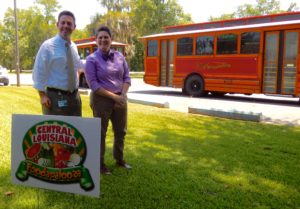
And already, we’re seeing those qualities in action, as Tipton announced, just days into his new post, that he would embark on a “listening and learning tour” across the state.
But first, we wanted to do a little listening and learning ourselves, stealing a moment to get to know the new president a little better. We tapped Tipton for an interview and found out why this born-and-bred Louisianian is so dedicated to non-profit work. And, in the process, discovered that this Foundation prez is hardly all work and no play – he’s even been known to dance for money, run for color, and, very recently, marry for love.
We like him already…
Q: So, can I just start off here by quickly commenting on the photos you sent in to use for this blog? Some of those are really great – the shot of you finishing the Baton Rouge Color Run and, of course, the one of you beaming next to your new bride. But I have to admit, my favorite just might be the one of you tearing up the dance floor in full costume.
A: Thank you! I was a participant in Dancing for Big Buddy a little over a year ago. That photo, of myself and my partner, Kris Cangelosi, is of our dance routine’s finale. I always believed it was important for non-profit leaders to work together to support important community causes and this was a great way for me as the leader of Teach For America to show our support for the work of programs like Big Buddy.
Q: Well it’s good to know you aren’t above risking embarrassment in the name of a good cause! That’s a nice quality.
A: Thanks! It was embarrassing at points, but also great exercise, lots of fun and for a good cause.
Q: So, congratulations on your new job. What made you decide to join the Blue Cross and Blue Shield of Louisiana Foundation?
A: The Foundation has a really impressive history of bridging the work of health and education and using that work to bring good things to bear for the people of Louisiana. And, in particular, the Foundation is very focused on kids’ health and the problem of childhood obesity in an important way. It’s no surprise we have a lot of challenges in Louisiana. And by focusing on health and education, and the way those two areas intersect, seemed like a good way to extend my personal focus on Louisiana and improving the quality of life for all of our state’s children.
Q: That’s an interesting point of view. You’re right, of course. There is a lot of overlap between the fields of education and health. So you see ways to leverage what you’ve learned in the education arena and marry that with the Foundation’s goals to teach and support our communities in ways to be healthier.
A: Yes, I do see a lot of overlap. And I think my background as a teacher, as a non-profit leader, as a grant-writer and as Louisiana native will help me better understand the work here. I’m familiar with the Foundation. I got to know Christy Reeves (the Foundation’s former executive director) as one of the Foundation’s grantees and as a partner in the community. I was a Leadership Baton Rouge and Leadership Louisiana classmate with various senior leaders at Blue Cross, I have a number of friends and colleagues who work at Blue Cross and I even had some Blue Cross leaders guest teach alongside Teach For America teachers in years past.
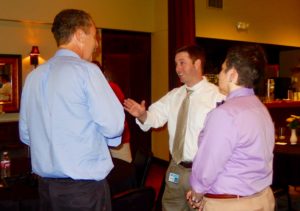
Q: Still, you are clearly eager to learn more. You’ve announced you want to travel the state, embarking on a “listening and learning tour.” What are you hoping to accomplish?
A: The Foundation has been and will continue to focus on health in Louisiana. But that can mean a lot of different things to a lot of different people. All communities are different. So this will be about understanding those different needs. Is it better access to healthy foods? Or convening groups together to tackle a big community need? I want to know how we can be the best collaborative partner to help communities meet their specific goals.

Q: Well it certainly helps that you are from Louisiana and a graduate of LSU. You understand how much we love our culture – which includes a tradition of celebrating with some pretty unhealthy foods.
A: Right, I do understand. I grew up in Louisiana. I think there are wonderful things about this state. But I think there are ways to celebrate what’s best about Louisiana and still tackle things that aren’t best about Louisiana. We have great food, for example. But I don’t believe our way of life necessarily has to go hand-in-hand with poor health and obesity. We can tackle these problems, but first, we have to be open to having the conversation about these problems and to working together to make the type of life we want.
Q: True. But a lot of folks can be pretty defensive about their way of life here.
A: I think that can be true. I’d say, though, that I’m not coming to this to try and tell what we should do but rather am asking for their help to figure out what we want to do together. I like to look at a problem and say, “ Do we agree that there is a problem here and, if so, what do you want to change? And how can I help with that?” That’s what drove me as a teacher. Helping my students achieve what they wanted for their future rather than any answer I was providing to them. I think that type of work appeals to me. Doing the work work day-by-day to eliminate challenges so we can have better education outcomes and health outcomes in alignment with where our community is and wants to be.”
Q: That can be a daunting task.
A: Yes, but at some point, daunting just means areas we need to focus on… You know, I remember as a first year teacher, feeling exhausted and worn down. But I never wondered why I’m doing this work. The purpose was always very clear, every day. I’m sure many of our colleagues across the state feel the same way in the organizations they lead. They are clear on why they do what they do. The challenges and the opportunities are very real and that helps them focus and do the work every day.
Q: Clearly you have a very strong commitment to non-profit work. What do you think drives that?
A: The people I meet are probably the biggest drivers of this. I can think of so many students who inspired me, when I taught in the Bronx and who continue to inspire me regularly through their outreach. When I came back home, the people I met across Louisiana as part of Teach For America – both those who taught and the thousands of people I met doing good work to make their communities better. Not just non-profit workers, but parents, community leaders and people who act as partners to get the job done.
Q: The local heroes.
A: I’ve never really liked the concept of hero, per se. There are so many people doing really good things who are never recognized as a hero. They’re just out there, doing good work because it needs to be done. I think that is incredibly meaningful, important and even heroic but they don’t see themselves as heroes and will keep their head down and keep working to make things better.
Q: Let’s talk about what you see ahead for the Foundation. Do you see the current programs, like Challenge for a Healthier Louisiana, Angel Awards and Smart Bodies, continuing on?
A: Yes, I do, although what they will look like will likely change some. We want to build upon these effortsand take timeless aspects them, innovate and try some new ideas and see how we can do even more good in the years to come. I’d like to encourage more collaboration with other health-focused foundations to take on the perennial challenges in Louisiana. We did that with Challenge Grant, taking on obesity. And I believe we can work with others to do so again in areas like prenatal care, early childhood education and other quality of life concerns that we know play themselves out in health over time.
Q: Changing gears for a moment, certainly your life involves more than
just work. Tell us, how is newlywed life going?
A: Well, I got married May 23 in Decatur, Georgia, at Sarah’s (my wife’s) alma mater, Agnes Scott College. Then we took a mini honeymoon to Charleston, South Carolina. Then we came back and I dove into this new role and she is finishing up her graduate degree in counseling. All is going well and we’re quite happy!
Q: How did you meet your new wife, Sarah?
A: We met through Teach For America, where she was a teacher in North Baton Rouge. She completed a Fulbright in Indonesia before joining Teach For America and then taught in North Baton Rouge and Pointe Coupee parishes before enrolling in graduate school at LSU. After her teaching with Teach For America we got to know each other better through some volunteering work and one thing led to another. Sarah is now finishing up her graduate degree in counseling and is in the process of looking to start in a mental health counseling role this fall.

Q: And how do you blow off steam?
A: I enjoy traveling and learning new things. Earlier this year, I took a week to see to see a list of place I’d always wanted to see in Louisiana – the Louisiana Political Museum in Winnesboro, Poverty Point in Northeast Louisiana among many others. I love history and so that was a lot of fun to me. I’m also very active in my church (University Baptist Church in Baton Rouge), I’m a Rotary member, I serve on several non-profit boards including the board of LSU’s professional theater, Swine Palace and of THRIVE, a local boarding school for kids in Baton Rouge.
Q: Impressive! You know, Michael, it’s obvious you not only care about the work you do, but you care about the state you live in very much.
A: This is a place I love. Other than my time in the South Bronx in New York, this has been home and is a place where I’ve dedicated my career. We believe in a joy-filled, exciting life. Yet, in many ways, our choices are cut short. Health and education – we’ve been at the bottom of those lists, nationally. But nothing makes us inherently there. We’ve got to figure out how to do something about that.
Q: You’re talking about bold changes, Michael.
A: Sure. But I also know and believe in so many people here and know that we’re able to make these changes and do even more. I’m looking forward to meeting many more great folks in the weeks to come, asking a lot of questions and figuring out how I and how the Foundation can support there efforts. I’m going to do my best to be a good partner and help make this state a place where we can all continue to enjoy and to thrive for many years to come.
